A Report on the Support Work in Social Care and its Key Aspects
VerifiedAdded on 2020/07/23
|6
|1224
|353
Report
AI Summary
This report provides an overview of the roles and responsibilities of non-direct care workers in social care settings. It identifies key aspects such as the importance of interpersonal skills for effective interaction, the role of these workers in team operations, and their duties in maintaining health, safety, and security within the environment. The report also emphasizes the significance of supervision and management in the development and performance of non-direct care workers, highlighting how these elements contribute to efficient processes and positive relationships within social care. References to relevant literature support the discussed concepts.
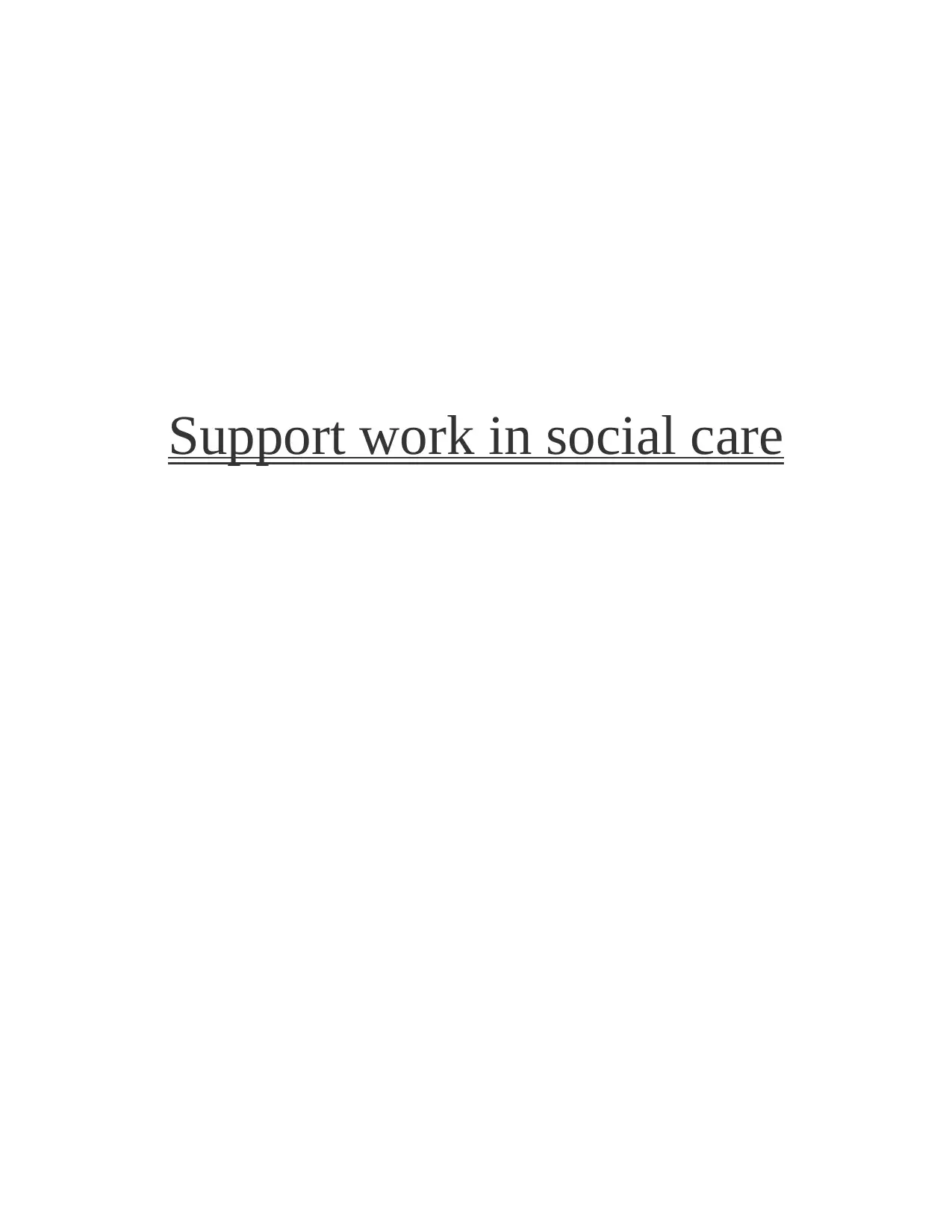
Support work in social care
Paraphrase This Document
Need a fresh take? Get an instant paraphrase of this document with our AI Paraphraser
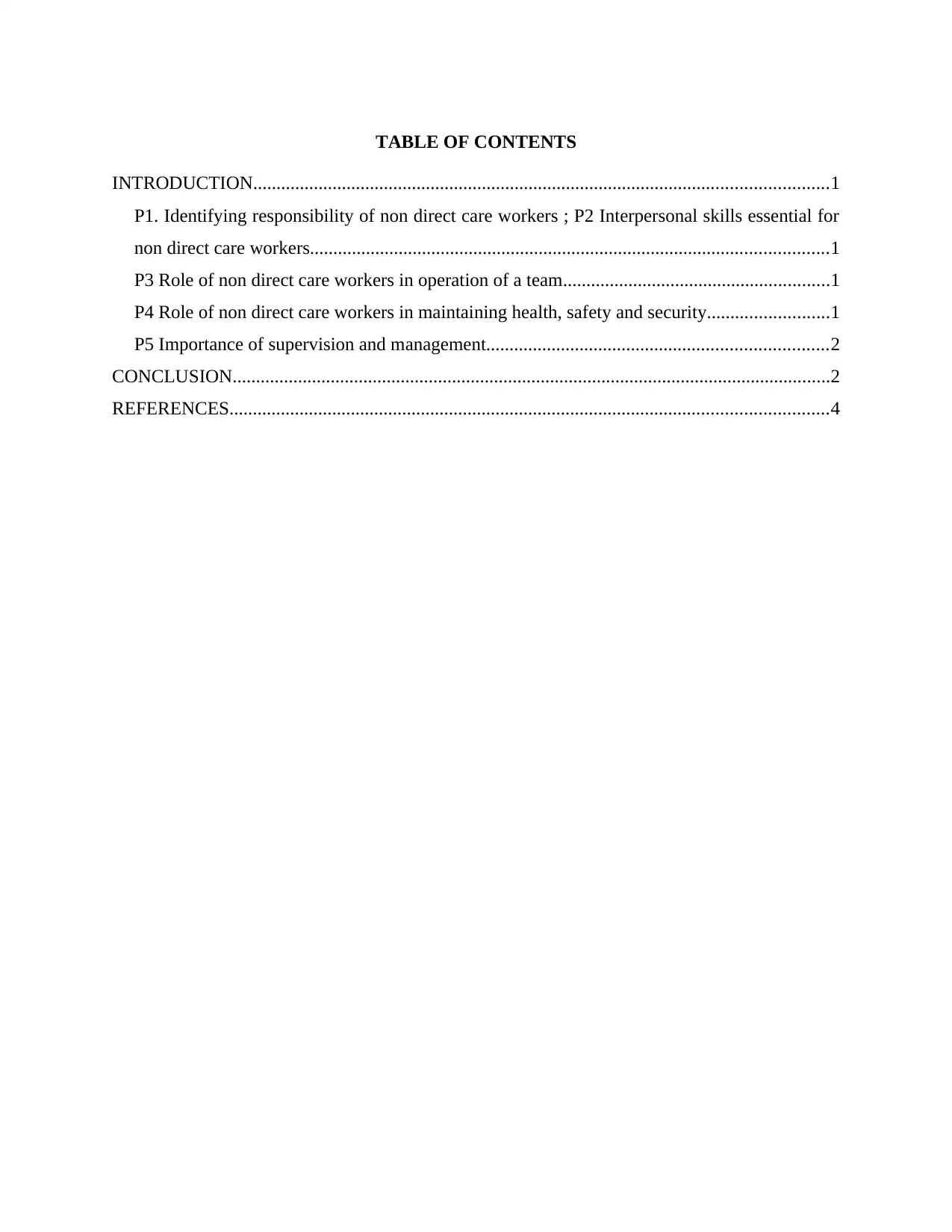
TABLE OF CONTENTS
INTRODUCTION...........................................................................................................................1
P1. Identifying responsibility of non direct care workers ; P2 Interpersonal skills essential for
non direct care workers...............................................................................................................1
P3 Role of non direct care workers in operation of a team.........................................................1
P4 Role of non direct care workers in maintaining health, safety and security..........................1
P5 Importance of supervision and management.........................................................................2
CONCLUSION................................................................................................................................2
REFERENCES................................................................................................................................4
INTRODUCTION...........................................................................................................................1
P1. Identifying responsibility of non direct care workers ; P2 Interpersonal skills essential for
non direct care workers...............................................................................................................1
P3 Role of non direct care workers in operation of a team.........................................................1
P4 Role of non direct care workers in maintaining health, safety and security..........................1
P5 Importance of supervision and management.........................................................................2
CONCLUSION................................................................................................................................2
REFERENCES................................................................................................................................4
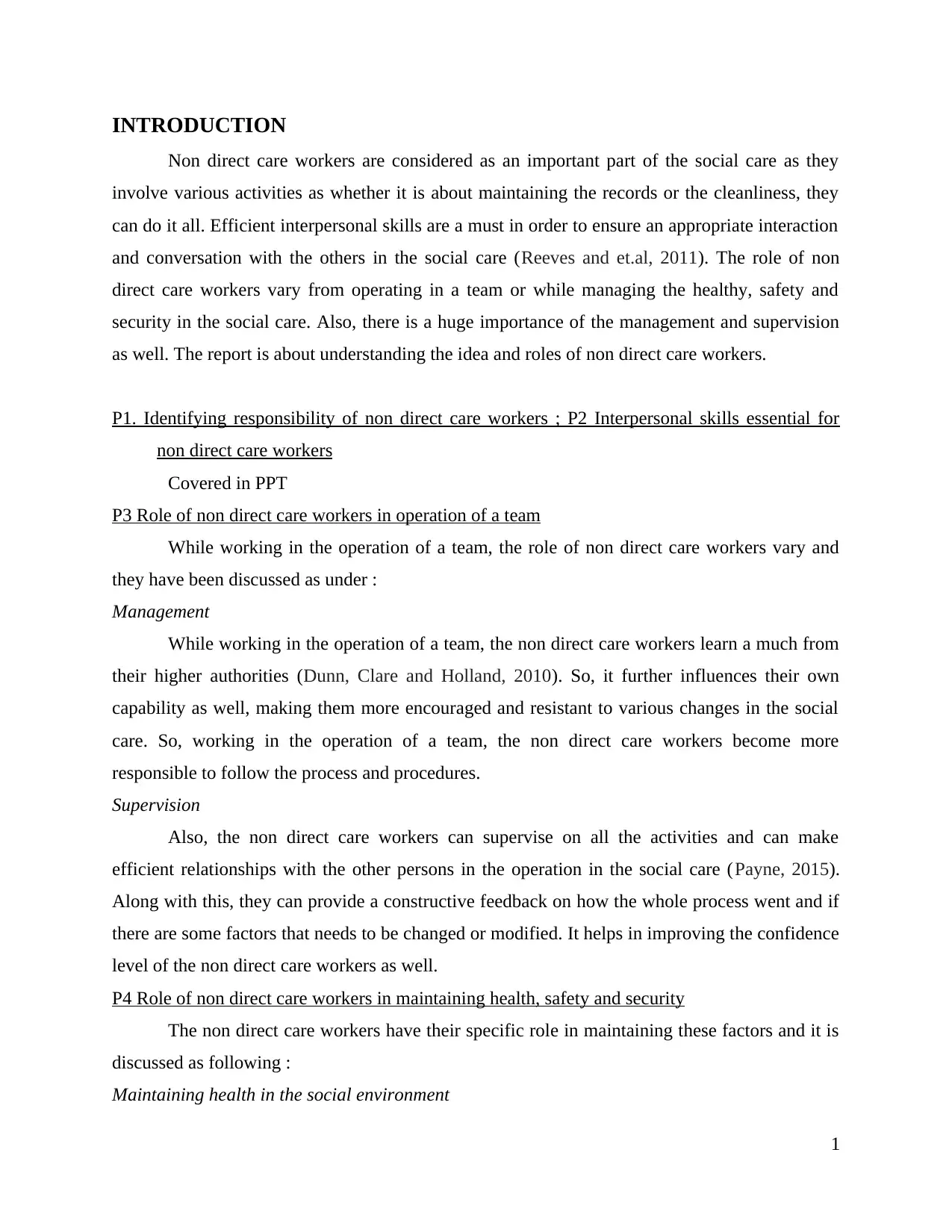
INTRODUCTION
Non direct care workers are considered as an important part of the social care as they
involve various activities as whether it is about maintaining the records or the cleanliness, they
can do it all. Efficient interpersonal skills are a must in order to ensure an appropriate interaction
and conversation with the others in the social care (Reeves and et.al, 2011). The role of non
direct care workers vary from operating in a team or while managing the healthy, safety and
security in the social care. Also, there is a huge importance of the management and supervision
as well. The report is about understanding the idea and roles of non direct care workers.
P1. Identifying responsibility of non direct care workers ; P2 Interpersonal skills essential for
non direct care workers
Covered in PPT
P3 Role of non direct care workers in operation of a team
While working in the operation of a team, the role of non direct care workers vary and
they have been discussed as under :
Management
While working in the operation of a team, the non direct care workers learn a much from
their higher authorities (Dunn, Clare and Holland, 2010). So, it further influences their own
capability as well, making them more encouraged and resistant to various changes in the social
care. So, working in the operation of a team, the non direct care workers become more
responsible to follow the process and procedures.
Supervision
Also, the non direct care workers can supervise on all the activities and can make
efficient relationships with the other persons in the operation in the social care (Payne, 2015).
Along with this, they can provide a constructive feedback on how the whole process went and if
there are some factors that needs to be changed or modified. It helps in improving the confidence
level of the non direct care workers as well.
P4 Role of non direct care workers in maintaining health, safety and security
The non direct care workers have their specific role in maintaining these factors and it is
discussed as following :
Maintaining health in the social environment
1
Non direct care workers are considered as an important part of the social care as they
involve various activities as whether it is about maintaining the records or the cleanliness, they
can do it all. Efficient interpersonal skills are a must in order to ensure an appropriate interaction
and conversation with the others in the social care (Reeves and et.al, 2011). The role of non
direct care workers vary from operating in a team or while managing the healthy, safety and
security in the social care. Also, there is a huge importance of the management and supervision
as well. The report is about understanding the idea and roles of non direct care workers.
P1. Identifying responsibility of non direct care workers ; P2 Interpersonal skills essential for
non direct care workers
Covered in PPT
P3 Role of non direct care workers in operation of a team
While working in the operation of a team, the role of non direct care workers vary and
they have been discussed as under :
Management
While working in the operation of a team, the non direct care workers learn a much from
their higher authorities (Dunn, Clare and Holland, 2010). So, it further influences their own
capability as well, making them more encouraged and resistant to various changes in the social
care. So, working in the operation of a team, the non direct care workers become more
responsible to follow the process and procedures.
Supervision
Also, the non direct care workers can supervise on all the activities and can make
efficient relationships with the other persons in the operation in the social care (Payne, 2015).
Along with this, they can provide a constructive feedback on how the whole process went and if
there are some factors that needs to be changed or modified. It helps in improving the confidence
level of the non direct care workers as well.
P4 Role of non direct care workers in maintaining health, safety and security
The non direct care workers have their specific role in maintaining these factors and it is
discussed as following :
Maintaining health in the social environment
1
⊘ This is a preview!⊘
Do you want full access?
Subscribe today to unlock all pages.

Trusted by 1+ million students worldwide
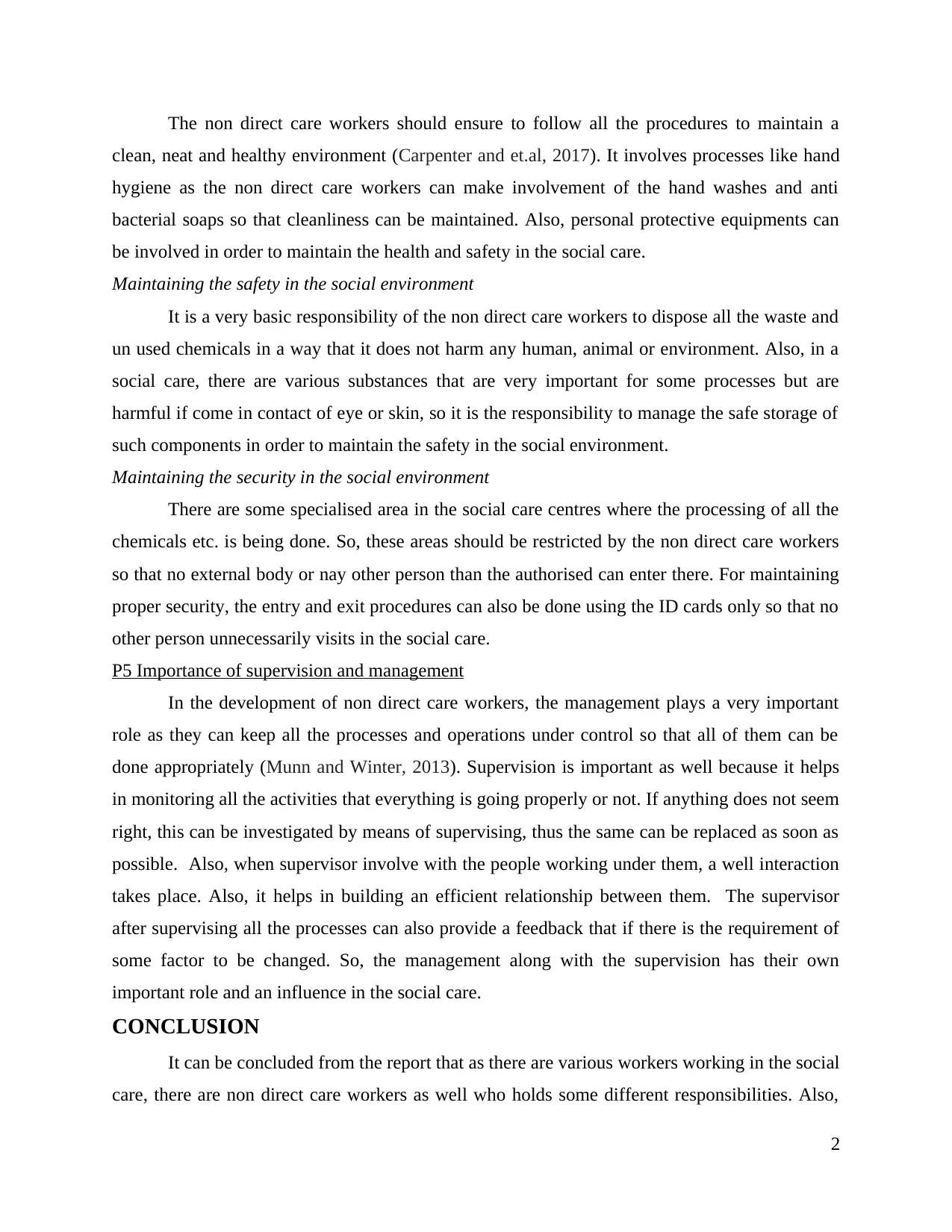
The non direct care workers should ensure to follow all the procedures to maintain a
clean, neat and healthy environment (Carpenter and et.al, 2017). It involves processes like hand
hygiene as the non direct care workers can make involvement of the hand washes and anti
bacterial soaps so that cleanliness can be maintained. Also, personal protective equipments can
be involved in order to maintain the health and safety in the social care.
Maintaining the safety in the social environment
It is a very basic responsibility of the non direct care workers to dispose all the waste and
un used chemicals in a way that it does not harm any human, animal or environment. Also, in a
social care, there are various substances that are very important for some processes but are
harmful if come in contact of eye or skin, so it is the responsibility to manage the safe storage of
such components in order to maintain the safety in the social environment.
Maintaining the security in the social environment
There are some specialised area in the social care centres where the processing of all the
chemicals etc. is being done. So, these areas should be restricted by the non direct care workers
so that no external body or nay other person than the authorised can enter there. For maintaining
proper security, the entry and exit procedures can also be done using the ID cards only so that no
other person unnecessarily visits in the social care.
P5 Importance of supervision and management
In the development of non direct care workers, the management plays a very important
role as they can keep all the processes and operations under control so that all of them can be
done appropriately (Munn and Winter, 2013). Supervision is important as well because it helps
in monitoring all the activities that everything is going properly or not. If anything does not seem
right, this can be investigated by means of supervising, thus the same can be replaced as soon as
possible. Also, when supervisor involve with the people working under them, a well interaction
takes place. Also, it helps in building an efficient relationship between them. The supervisor
after supervising all the processes can also provide a feedback that if there is the requirement of
some factor to be changed. So, the management along with the supervision has their own
important role and an influence in the social care.
CONCLUSION
It can be concluded from the report that as there are various workers working in the social
care, there are non direct care workers as well who holds some different responsibilities. Also,
2
clean, neat and healthy environment (Carpenter and et.al, 2017). It involves processes like hand
hygiene as the non direct care workers can make involvement of the hand washes and anti
bacterial soaps so that cleanliness can be maintained. Also, personal protective equipments can
be involved in order to maintain the health and safety in the social care.
Maintaining the safety in the social environment
It is a very basic responsibility of the non direct care workers to dispose all the waste and
un used chemicals in a way that it does not harm any human, animal or environment. Also, in a
social care, there are various substances that are very important for some processes but are
harmful if come in contact of eye or skin, so it is the responsibility to manage the safe storage of
such components in order to maintain the safety in the social environment.
Maintaining the security in the social environment
There are some specialised area in the social care centres where the processing of all the
chemicals etc. is being done. So, these areas should be restricted by the non direct care workers
so that no external body or nay other person than the authorised can enter there. For maintaining
proper security, the entry and exit procedures can also be done using the ID cards only so that no
other person unnecessarily visits in the social care.
P5 Importance of supervision and management
In the development of non direct care workers, the management plays a very important
role as they can keep all the processes and operations under control so that all of them can be
done appropriately (Munn and Winter, 2013). Supervision is important as well because it helps
in monitoring all the activities that everything is going properly or not. If anything does not seem
right, this can be investigated by means of supervising, thus the same can be replaced as soon as
possible. Also, when supervisor involve with the people working under them, a well interaction
takes place. Also, it helps in building an efficient relationship between them. The supervisor
after supervising all the processes can also provide a feedback that if there is the requirement of
some factor to be changed. So, the management along with the supervision has their own
important role and an influence in the social care.
CONCLUSION
It can be concluded from the report that as there are various workers working in the social
care, there are non direct care workers as well who holds some different responsibilities. Also,
2
Paraphrase This Document
Need a fresh take? Get an instant paraphrase of this document with our AI Paraphraser
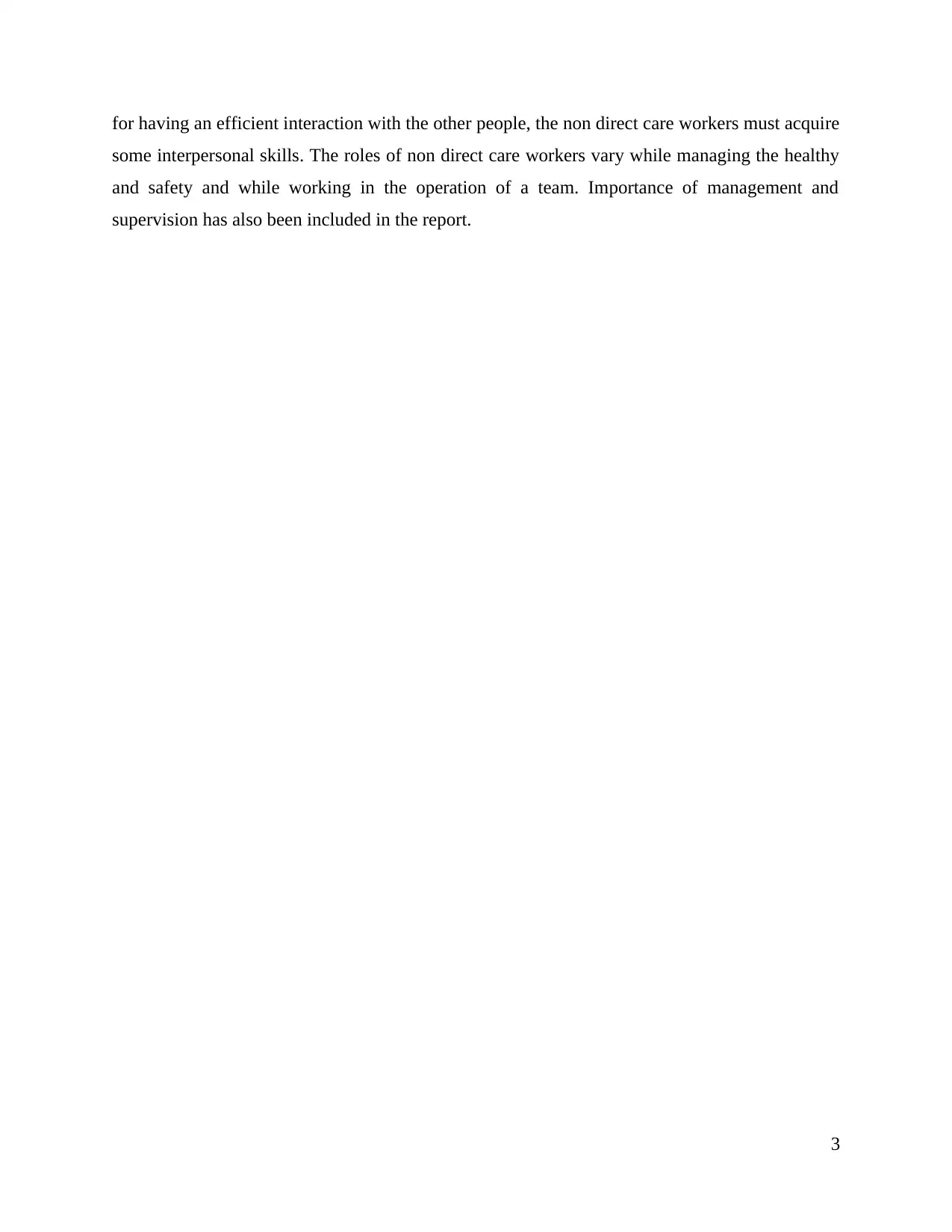
for having an efficient interaction with the other people, the non direct care workers must acquire
some interpersonal skills. The roles of non direct care workers vary while managing the healthy
and safety and while working in the operation of a team. Importance of management and
supervision has also been included in the report.
3
some interpersonal skills. The roles of non direct care workers vary while managing the healthy
and safety and while working in the operation of a team. Importance of management and
supervision has also been included in the report.
3
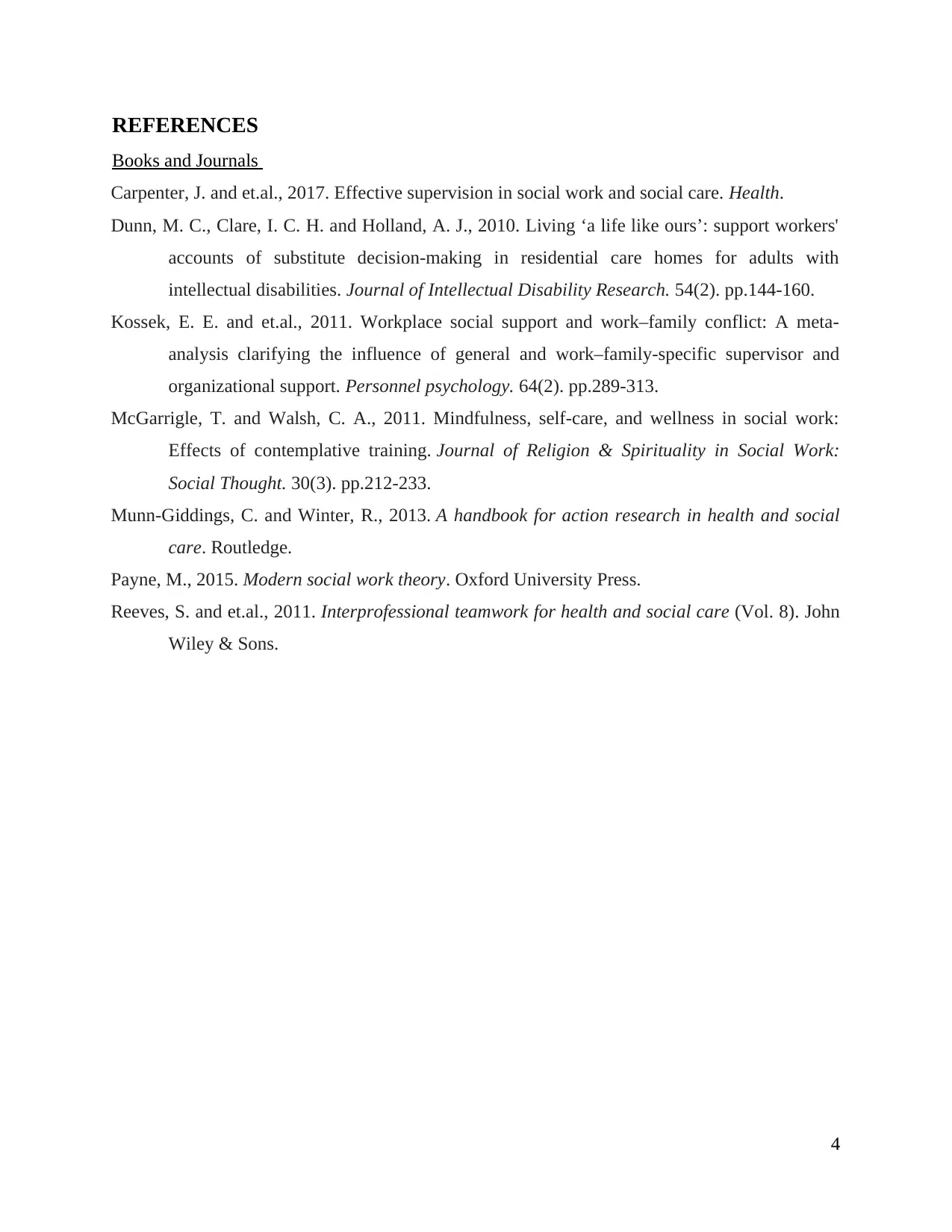
REFERENCES
Books and Journals
Carpenter, J. and et.al., 2017. Effective supervision in social work and social care. Health.
Dunn, M. C., Clare, I. C. H. and Holland, A. J., 2010. Living ‘a life like ours’: support workers'
accounts of substitute decision‐making in residential care homes for adults with
intellectual disabilities. Journal of Intellectual Disability Research. 54(2). pp.144-160.
Kossek, E. E. and et.al., 2011. Workplace social support and work–family conflict: A meta‐
analysis clarifying the influence of general and work–family‐specific supervisor and
organizational support. Personnel psychology. 64(2). pp.289-313.
McGarrigle, T. and Walsh, C. A., 2011. Mindfulness, self-care, and wellness in social work:
Effects of contemplative training. Journal of Religion & Spirituality in Social Work:
Social Thought. 30(3). pp.212-233.
Munn-Giddings, C. and Winter, R., 2013. A handbook for action research in health and social
care. Routledge.
Payne, M., 2015. Modern social work theory. Oxford University Press.
Reeves, S. and et.al., 2011. Interprofessional teamwork for health and social care (Vol. 8). John
Wiley & Sons.
4
Books and Journals
Carpenter, J. and et.al., 2017. Effective supervision in social work and social care. Health.
Dunn, M. C., Clare, I. C. H. and Holland, A. J., 2010. Living ‘a life like ours’: support workers'
accounts of substitute decision‐making in residential care homes for adults with
intellectual disabilities. Journal of Intellectual Disability Research. 54(2). pp.144-160.
Kossek, E. E. and et.al., 2011. Workplace social support and work–family conflict: A meta‐
analysis clarifying the influence of general and work–family‐specific supervisor and
organizational support. Personnel psychology. 64(2). pp.289-313.
McGarrigle, T. and Walsh, C. A., 2011. Mindfulness, self-care, and wellness in social work:
Effects of contemplative training. Journal of Religion & Spirituality in Social Work:
Social Thought. 30(3). pp.212-233.
Munn-Giddings, C. and Winter, R., 2013. A handbook for action research in health and social
care. Routledge.
Payne, M., 2015. Modern social work theory. Oxford University Press.
Reeves, S. and et.al., 2011. Interprofessional teamwork for health and social care (Vol. 8). John
Wiley & Sons.
4
⊘ This is a preview!⊘
Do you want full access?
Subscribe today to unlock all pages.

Trusted by 1+ million students worldwide
1 out of 6
Related Documents
Your All-in-One AI-Powered Toolkit for Academic Success.
+13062052269
info@desklib.com
Available 24*7 on WhatsApp / Email
![[object Object]](/_next/static/media/star-bottom.7253800d.svg)
Unlock your academic potential
Copyright © 2020–2026 A2Z Services. All Rights Reserved. Developed and managed by ZUCOL.





